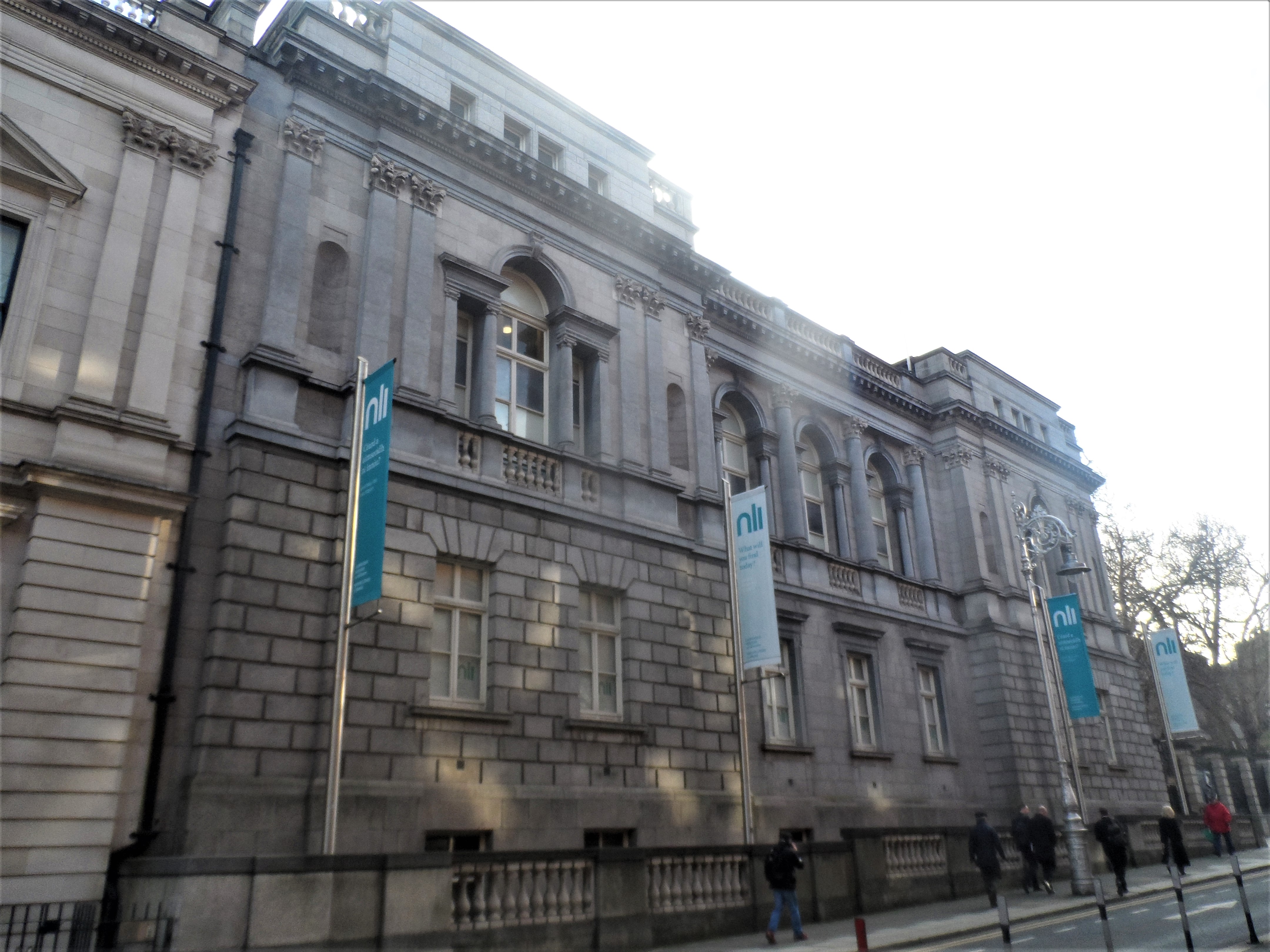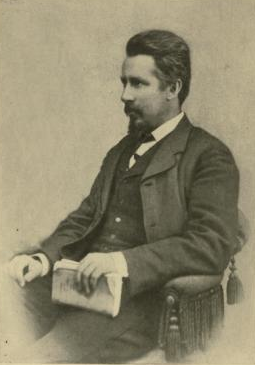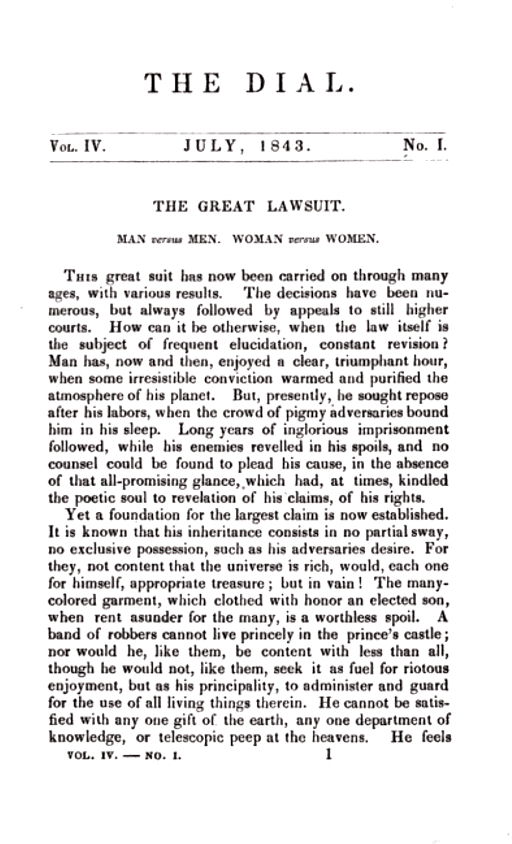|
William Kirkpatrick Magee
William Kirkpatrick Magee (16 January 1868 – 9 May 1961), was an Irish author, editor, and librarian, who as an essayist and poet adopted the pen-name of John Eglinton. He became head librarian of the National Library of Ireland, after opposing the "cultural nationalism" of his time. From 1904 to 1905 he edited the literary journal ''Dana'' and was the biographer of George William Russell ("Æ"). Early life Magee was born in Dublin, the second son of a Presbyterian minister originally from Ulster, the Rev. Hamilton Magee, by his marriage to Emily Clare Kirkpatrick. His parents had been married at St Mary's Church, Dublin, on 5 April 1860, when their fathers' names were given as William G. Kirkpatrick and Henry Bell Magee. He was the younger brother of Hamilton Malcolm Magee, born in 1866, and another brother, James Henry Magee, was born in 1870. The young Magee was educated at the Erasmus Smith High School, Dublin, where he got to know W. B. Yeats. He entered Trinity College, ... [...More Info...] [...Related Items...] OR: [Wikipedia] [Google] [Baidu] |
National Library Of Ireland
The National Library of Ireland (NLI; ga, Leabharlann Náisiúnta na hÉireann) is the Republic of Ireland's national library located in Dublin, in a building designed by Thomas Newenham Deane. The mission of the National Library of Ireland is 'To collect, preserve, promote and make accessible the documentary and intellectual record of the life of Ireland and to contribute to the provision of access to the larger universe of recorded knowledge.' The library is a reference library and, as such, does not lend. It has a large quantity of Irish and Irish-related material which can be consulted without charge; this includes books, maps, manuscripts, music, newspapers, periodicals and photographs. Included in their collections is material issued by private as well as government publishers. The Chief Herald of Ireland and National Photographic Archive are attached to the library. The library holds Art exhibition, exhibitions and holds an archive of List of Irish newspapers, Irish ne ... [...More Info...] [...Related Items...] OR: [Wikipedia] [Google] [Baidu] |
Edward Dowden
Edward Dowden (3 May 18434 April 1913) was an Irish critic, professor, and poet. Biography He was the son of John Wheeler Dowden, a merchant and landowner, and was born at Cork, three years after his brother John, who became Bishop of Edinburgh in 1886. Edward's literary tastes emerged early, in a series of essays written at the age of twelve. His home education continued at Queen's College, Cork and at Trinity College, Dublin. He contributed to the literary magazine ''Kottabos.'' He had a distinguished career, becoming president of the Philosophical Society, and won the vice-chancellor's prize for English verse and prose, and the first senior moderatorship in ethics and logic. In 1867 he was elected professor of oratory and English literature in Dublin University. Dowden's first book, ''Shakspere: A Critical Study of His Mind and Art'' (1875),Dowden 1875, ''Shakspere: A Critical Study of His Mind and Art'': Online editionin HathiTrust Digital Library. resulted from a revis ... [...More Info...] [...Related Items...] OR: [Wikipedia] [Google] [Baidu] |
People Educated At The High School, Dublin
A person ( : people) is a being that has certain capacities or attributes such as reason, morality, consciousness or self-consciousness, and being a part of a culturally established form of social relations such as kinship, ownership of property, or legal responsibility. The defining features of personhood and, consequently, what makes a person count as a person, differ widely among cultures and contexts. In addition to the question of personhood, of what makes a being count as a person to begin with, there are further questions about personal identity and self: both about what makes any particular person that particular person instead of another, and about what makes a person at one time the same person as they were or will be at another time despite any intervening changes. The plural form "people" is often used to refer to an entire nation or ethnic group (as in "a people"), and this was the original meaning of the word; it subsequently acquired its use as a plural form of ... [...More Info...] [...Related Items...] OR: [Wikipedia] [Google] [Baidu] |
Writers From Dublin (city)
A writer is a person who uses written words in different writing styles and techniques to communicate ideas. Writers produce different forms of literary art and creative writing such as novels, short stories, books, poetry, travelogues, plays, screenplays, teleplays, songs, and essays as well as other reports and news articles that may be of interest to the general public. Writers' texts are published across a wide range of media. Skilled writers who are able to use language to express ideas well, often contribute significantly to the cultural content of a society. The term "writer" is also used elsewhere in the arts and music, such as songwriter or a screenwriter, but also a stand-alone "writer" typically refers to the creation of written language. Some writers work from an oral tradition. Writers can produce material across a number of genres, fictional or non-fictional. Other writers use multiple media such as graphics or illustration to enhance the communication of thei ... [...More Info...] [...Related Items...] OR: [Wikipedia] [Google] [Baidu] |
1961 Deaths
Events January * January 3 ** United States President Dwight D. Eisenhower announces that the United States has severed diplomatic and consular relations with Cuba (Cuba–United States relations are restored in 2015). ** Aero Flight 311 (Koivulahti air disaster): Douglas DC-3C OH-LCC of Finnish airline Finnair, Aero crashes near Kvevlax (Koivulahti), on approach to Vaasa Airport in Finland, killing all 25 on board, due to pilot error: an investigation finds that the Captain (civil aviation), captain and First officer (civil aviation), first officer were both exhausted for lack of sleep, and had consumed excessive amounts of alcohol at the time of the crash. It remains the deadliest air disaster to occur in the country. * January 5 ** Italian sculptor Alfredo Fioravanti marches into the U.S. Consulate in Rome, and confesses that he was part of the team that forged the Etruscan terracotta warriors in the Metropolitan Museum of Art. ** After the 1960 Turkish coup d'état, 1960 ... [...More Info...] [...Related Items...] OR: [Wikipedia] [Google] [Baidu] |
1868 Births
Events January–March * January 2 – British Expedition to Abyssinia: Robert Napier leads an expedition to free captive British officials and missionaries. * January 3 – The 15-year-old Mutsuhito, Emperor Meiji of Japan, declares the ''Meiji Restoration'', his own restoration to full power, under the influence of supporters from the Chōshū and Satsuma Domains, and against the supporters of the Tokugawa shogunate, triggering the Boshin War. * January 5 – Paraguayan War: Brazilian Army commander Luís Alves de Lima e Silva, Duke of Caxias enters Asunción, Paraguay's capital. Some days later he declares the war is over. Nevertheless, Francisco Solano López, Paraguay's president, prepares guerrillas to fight in the countryside. * January 7 – The Arkansas constitutional convention meets in Little Rock. * January 9 – Penal transportation from Britain to Australia ends, with arrival of the convict ship ''Hougoumont'' in Western Aus ... [...More Info...] [...Related Items...] OR: [Wikipedia] [Google] [Baidu] |
Bartleby
"Bartleby, the Scrivener: A Story of Wall Street" is a short story by the American writer Herman Melville, first serialized anonymously in two parts in the November and December 1853 issues of ''Putnam's Magazine'' and reprinted with minor textual alterations in his ''The Piazza Tales'' in 1856. In the story, a Wall Street lawyer hires a new clerk who, after an initial bout of hard work, refuses to make copies or do any other task required of him, refusing with the words "I would prefer not to." Numerous critical essays have been published about the story, which scholar Robert Milder describes as "unquestionably the masterpiece of the short fiction" in the Melville canon. Plot The narrator is an unnamed elderly lawyer who works with legal documents and has an office on Wall Street. He already employs two scriveners, Turkey and Nippers, to copy documents by hand, but an increase in business leads him to advertise for a third. He hires the forlorn-looking Bartleby in the hope ... [...More Info...] [...Related Items...] OR: [Wikipedia] [Google] [Baidu] |
Encyclopædia Britannica
The (Latin for "British Encyclopædia") is a general knowledge English-language encyclopaedia. It is published by Encyclopædia Britannica, Inc.; the company has existed since the 18th century, although it has changed ownership various times through the centuries. The encyclopaedia is maintained by about 100 full-time editors and more than 4,000 contributors. The 2010 version of the 15th edition, which spans 32 volumes and 32,640 pages, was the last printed edition. Since 2016, it has been published exclusively as an online encyclopaedia. Printed for 244 years, the ''Britannica'' was the longest running in-print encyclopaedia in the English language. It was first published between 1768 and 1771 in the Scottish capital of Edinburgh, as three volumes. The encyclopaedia grew in size: the second edition was 10 volumes, and by its fourth edition (1801–1810) it had expanded to 20 volumes. Its rising stature as a scholarly work helped recruit eminent con ... [...More Info...] [...Related Items...] OR: [Wikipedia] [Google] [Baidu] |
The Dial
''The Dial'' was an American magazine published intermittently from 1840 to 1929. In its first form, from 1840 to 1844, it served as the chief publication of the Transcendentalists. From the 1880s to 1919 it was revived as a political review and literary criticism magazine. From 1920 to 1929 it was an influential outlet for modernist literature in English. Transcendentalist journal Members of the Hedge Club began talks for creating a vehicle for their essays and reviews in philosophy and religion in October 1839.Gura, Philip F. ''American Transcendentalism: A History''. New York: Hill and Wang, 2007: 128. Other influential journals, including the ''North American Review'' and the ''Christian Examiner'' refused to accept their work for publication. Orestes Brownson proposed utilizing his recently established periodical ''Boston Quarterly Review'' but members of the club decided a new publication was a better solution.Von Mehren, Joan. ''Minerva and the Muse: A Life of Margaret ... [...More Info...] [...Related Items...] OR: [Wikipedia] [Google] [Baidu] |
Bournemouth
Bournemouth () is a coastal resort town in the Bournemouth, Christchurch and Poole council area of Dorset, England. At the 2011 census, the town had a population of 183,491, making it the largest town in Dorset. It is situated on the Southern England, English south coast, equidistant () from Dorchester, Dorset, Dorchester and Southampton. Bournemouth is part of the South East Dorset conurbation, which has a population of 465,000. Before it was founded in 1810 by Lewis Tregonwell, the area was a deserted heathland occasionally visited by fishermen and smugglers. Initially marketed as a health resort, the town received a boost when it appeared in Augustus Granville's 1841 book, ''The Spas of England''. Bournemouth's growth accelerated with the arrival of the railway, and it became a town in 1870. Part of the Historic counties of England, historic county of Hampshire, Bournemouth joined Dorset for administrative purposes following the Local Government Act 1972, reorganisation of l ... [...More Info...] [...Related Items...] OR: [Wikipedia] [Google] [Baidu] |
United Kingdom Of Great Britain And Ireland
The United Kingdom of Great Britain and Ireland was a sovereign state in the British Isles that existed between 1801 and 1922, when it included all of Ireland. It was established by the Acts of Union 1800, which merged the Kingdom of Great Britain and the Kingdom of Ireland into a unified state. The establishment of the Irish Free State in 1922 led to the remainder later being renamed the United Kingdom of Great Britain and Northern Ireland in 1927. The United Kingdom, having financed the European coalition that defeated France during the Napoleonic Wars, developed a large Royal Navy that enabled the British Empire to become the foremost world power for the next century. For nearly a century from the final defeat of Napoleon following the Battle of Waterloo to the outbreak of World War I, Britain was almost continuously at peace with Great Powers. The most notable exception was the Crimean War with the Russian Empire, in which actual hostilities were relatively limited. How ... [...More Info...] [...Related Items...] OR: [Wikipedia] [Google] [Baidu] |
Irish Free State
The Irish Free State ( ga, Saorstát Éireann, , ; 6 December 192229 December 1937) was a state established in December 1922 under the Anglo-Irish Treaty of December 1921. The treaty ended the three-year Irish War of Independence between the forces of the Irish Republic – the Irish Republican Army (IRA) – and British Crown forces. The Free State was established as a dominion of the British Empire. It comprised 26 of the 32 counties of Ireland. Northern Ireland, which was made up of the remaining six counties, exercised its right under the Treaty to opt out of the new state. The Free State government consisted of the Governor-General – the representative of the king – and the Executive Council (cabinet), which replaced both the revolutionary Dáil Government and the Provisional Government set up under the Treaty. W. T. Cosgrave, who had led both of these administrations since August 1922, became the first President of the Executive Council (prime minister). The ... [...More Info...] [...Related Items...] OR: [Wikipedia] [Google] [Baidu] |


_1938.jpg)





